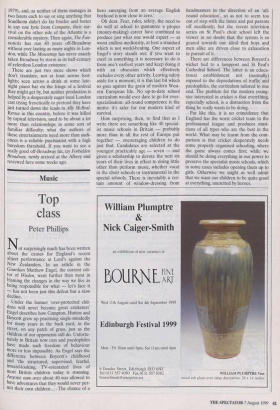Music
Top class
Peter Phillips
Not surprisingly much has been written about the causes for England's recent abject performance at Lord's against the New Zealanders. In an article in the Guardian Matthew Engel, the current edi- tor of Wisden, went further than most in blaming the changes in the way we live as being responsible for what — let's face it — has not been just this defeat but a slow decline.
Under the banner 'over-protected chil- dren will never become great cricketers' Engel describes how Compton, Hutton and Boycott grew up practising single-mindedly for many years in the back yard, in the street, on any patch of grass, just as the children of our opponents still do. Unfortu- nately in Britain now cars and paedophiles have made such freedom of behaviour more or less impossible. As Engel says the difference between Boycott's childhood and 'the structured, supervised, fearful, inward-looking, TV-orientated lives of most British children today is stunning. Anyone now over about 40 was allowed to have adventures that they would never per- mit their own children ... The chance of a hero emerging from an average English boyhood is now close to zero.'
Oh dear. Fear, rules, safety, the need to do well at school to guarantee a proper (money-making) career have combined to produce just what one would expect — at worst endless mediocrity, at best a standard which is not world-beating. One aspect of Engel's story stands out: if you want to excel in something it is necessary to do it from one's earliest years and keep doing it with an obsession which effectively excludes every other activity. Leaving safety aside for a moment, it is this last bit which so goes against the grain of modern West- ern European life. No up-to-date school curriculum would ever dare to go for over- specialisation: all-round competence is the motto: it's safer for our modern kind of survival.
How surprising, then, to find that as I write there are something like 40 special- ist music schools in Britain — probably more than in all the rest of Europe put together — encouraging children to do just that. Candidates are selected at the youngest practicable age — seven — and given a scholarship to devote the next six years of their lives in effect to doing little other than perform music, whether vocal in the choir schools or instrumental in the special schools. There is inevitably a cer- tain amount of window-dressing from headmasters in the direction of an 'all- round education', so as not to seem too out of step with the times and put parents off needlessly; but the recent television series on St Paul's choir school left the viewer in no doubt that the system is so geared towards one ideal that boys and men alike are driven close to exhaustion in pursuit of it.
There are differences between Boycott's wicket tied to a lamppost and St Paul's Cathedral School. The latter is an educa- tional establishment not (normally) exposed to the depredations of traffic and paedophiles, the curriculum tailored to one end. The problem for the modern young- ster interested in cricket is that everything, especially school, is a distraction from the thing he really wants to be doing.
Put like this, it is no coincidence that England has the worst cricket team in the professional league and produces musi- cians of all types who are the best in the world. What may be learnt from the com- parison is that cricket desperately needs some properly organised schooling, where the game always comes first; while we should be doing everything in our power to preserve the specialist music schools, which in some cases includes opening them up to girls. Otherwise we might as well admit that we want our children to be quite good at everything, unexcited by heroes.


























































 Previous page
Previous page